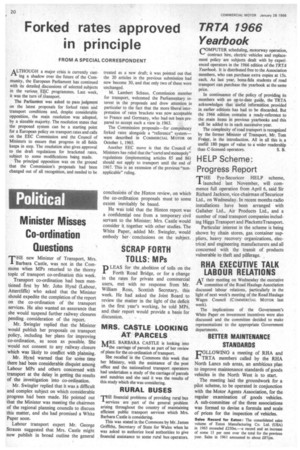Minister Misses Co-ordination Questions
Page 22

If you've noticed an error in this article please click here to report it so we can fix it.
rrHE new Minister of Transport, Mrs.
Barbara Castle, was not in the Commons when MPs returned to the thorny topic of transport co-ordination this week.
Transport co-ordination had been mentioned first by Mr. John Hynd (Labour, Attercliffe) who asked that the Minister should expedite the completion of the report on the co-ordination of the transport services. He also wanted an assurance that she would suspend further railway closures pending consideration of the report.
Mr. Swingler replied that the Minister would publish her proposals on transport policy, including her plans for improving co-ordination, as soon as possible. She would not consent to any railway closure which was likely to conflict with planning.
Mr. Hynd warned that for some time there had been considerable disquiet among Labour MPs and others concerned with transport at the delay in getting the results of the invettigation into co-ordination.
Mr. Swingler replied that it was a difficult and complex subject on which considerable progress had been made. He pointed out that the Minister was meeting the chairmen of the regional planning councils to discuss this matter, and she had promised a White Paper soon.
Labour transport expert Mr. George Strauss suggested that Mrs. Castle might now publish in broad outline the general
conclusions of the Hinton review, on which the co-ordination proposals must to some extent inevitably be based.
He was told that the Hinton report was a confidential one from a temporary civil servant to the Minister; Mrs. Castle would consider it together with other studies. The White Paper, added Mr. Swingler, would embody her. conclusions on the subject.












































































































